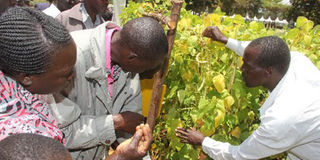Protection of plant variety is key to national development

Members of the public admire climbing beans crop during a tour of exhibition stands at University of Eldoret 4th Annual Agri-business Trade fair on September 24, 2015. The amendment Bill further seeks to amend section 27A of the Seeds and Plant Varieties Act to provide for the establishment of a Plant Genetic Resources Centre. PHOTO | JARED NYATAYA | NATION MEDIA GROUP
What you need to know:
- Of great importance, the Bill seeks to amend the long title of the Act to put it in accord with the devolved state of agriculture and expand its scope to include indigenous seeds and plant varieties.
- The proposed amendment will provide for the intellectual property protection of the country’s genetic resources.
- The country should make citizens to understand that the utilisation of Kenyan indigenous flora can only be successfully explored if the existing indigenous knowledge of the inhabitants is made available to science.
Parliament is currently considering passing an amendment to Seeds and Plants Varieties Act (Cap, 326) to facilitate the implementation of Article 11 (3) and 69 (1) of 2010 Constitution.
Both Articles require Parliament to enact legislation to recognise and protect the ownership of indigenous seeds and plant varieties, their genetic and diverse characteristics and their use by Kenyan communities, and the protection of genetic resources and biodiversity.
Of great importance, the Bill seeks to amend the long title of the Act to put it in accord with the devolved state of agriculture and expand its scope to include indigenous seeds and plant varieties.
The amendment Bill further seeks to amend section 27A of the Seeds and Plant Varieties Act to provide for the establishment of a Plant Genetic Resources Centre, which shall be responsible for conservation and regulation of access and benefits sharing of genetic resources for food and agriculture.
The proposed amendment will provide for the intellectual property protection of the country’s genetic resources.
BIODIVERSITY'S RELEVANCE
The Bill augments provisions contained in the Convention on Biological Biodiversity, which states that its members should conserve biological diversity, ensure its sustainable use and guarantee the fair and equitable sharing of the benefits arising out of the utilisation of genetic resources.
Biodiversity underpins the economic, social, and cultural lives of billions of people globally, particularly indigenous communities.
Biodiversity also has a commercial attraction.
Agriculture, pharmaceuticals, forestry, fisheries, and tourism, among others, are all major economic areas that are heavily dependent upon biodiversity, attracting the keen attention of industry researchers and investors.
It follows that therefore, timely amendment of this Act will guarantee protection of Kenya’s genetic resources against misuse and unauthorised exploitation by multinational corporations.
LOSING RIGHTS
The commercial development of naturally occurring biological materials, such as plant substances or genetic cell lines, by a technologically advanced countries or transnational corporations without fair compensation to the peoples or nations of the developing world is one of the most serious cases of the exploitation of resources.
Several cases abound where indigenous peoples have lost right to manage and exploit their own resources.
The most celebrated case to date involves the Hoodia cactus from the Kalahari Desert.
For centuries, the San people of southern Africa ate pieces of the cactus to stave off hunger and thirst.
Analysing the cactus, the Council for Scientific and Industrial Research (CSIR) in South Africa found the molecule that curbs appetite and sold the rights to develop an anti-obesity drug to an American pharmaceutical company.
In 2003, the Kenyan Government was locked in a less publicised altercation with one Jonathan Leakey over exports of products of a tree known as Mweri in the Gikuyu language.
Mweri, otherwise known as the African Plum or Pygeum (‘Prunus Africana’ in the scientific world), is a multipurpose tree.
The dark brown bark of the tree is used for treating many diseases, among them genito-urinary complications, allergies, inflammations, kidney disease, malaria, stomach ache and fever.
PUBLIC AWARENESS
It has also been used in the treatment of benign prostatic hyperplasia (BPH) and ‘old man’s disease’.
Despite its well known indigenous origins Mweri bark extract is patented by a French entrepreneur, Dr Jacques Debat.
The country should make citizens to understand that the utilisation of Kenyan indigenous flora can only be successfully explored if the existing indigenous knowledge of the inhabitants is made available to science.
By forming associations between alternative medicine practitioners, traditional healers, herbalists and scientists, medicinal plants can be investigated. From these associations, industries can be formed to commercialise the products.




